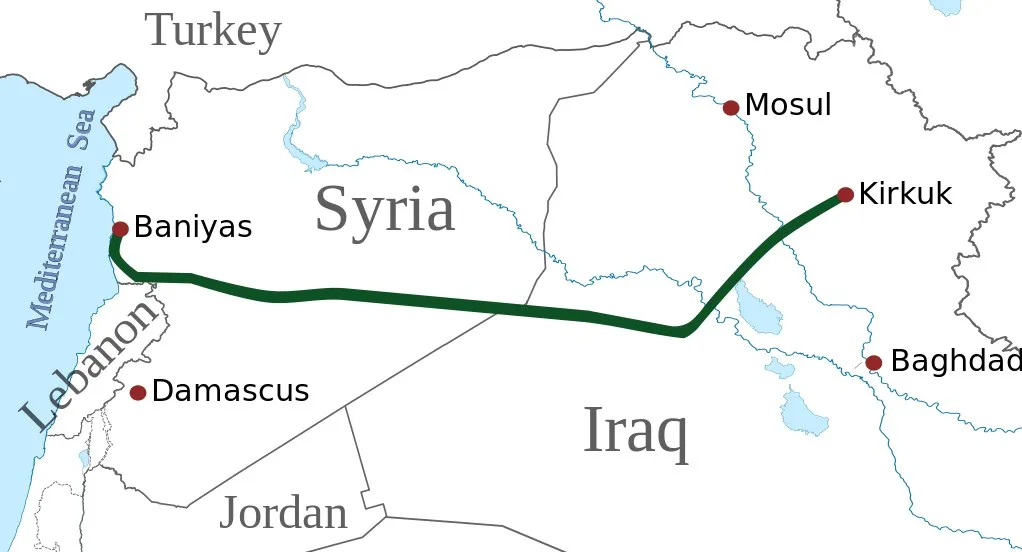Iraq and Syria to Re-Open Crucial Oil Pipeline
TRANSCEND MEMBERS, 15 May 2023
Vanessa Beeley – TRANSCEND Media Service
An end to US regional resource piracy is finally in sight with the Russia-Iran alliance.
8 May 2023 – According to various media reports– negotiations are ongoing to revive the strategic Iraqi Kirkuk to Syrian Baniyas oil pipeline. Iraqi Trade Minister Atheer Al Ghurairy has intimated increased efforts by Iraq to develop energy cooperation with Syria in the coming months and years.
During a meeting with the Syrian Oil and Mineral Resources Minister Firas Hassan Kaddour views were exchanged on the launch of investment in oil and energy fields in both countries. Despite the current US military and proxy occupation of Syrian oil resources, Kaddour presented a strategy to facilitate investment by Iraqi companies in the Syrian oil industry. On the table was the restoration of the Kirkuk-Baniyas oil pipeline which would re-connect Iraqi oil fields with Syrian maritime ports and crude oil refineries.
This would resolve some of Syrian energy deprivation issues and provide Iraq with a more expedient oil transport route to refineries in Syria that could process the 12% of total Iraqi oil reserves that originate in Kirkuk.
The reactivation of the Kirkuk-Banias oil pipeline will be “crucial” for Syria as it would end the country’s power crisis, the minister said, adding that the pipeline is of an “exponential importance” for Iraq as it could cut the cost of exporting oil.
For Syria, added benefits would include a stimulation of trade in Syrian ports by increasing maritime traffic despite the threat of punitive US Caesar sanctions that target sovereign nations trade or collaboration with Syria. The Syrian economy would receive a boost from such trade and industry revival.
Atheer said that initial assessments indicate that the oil pipeline, which was heavily damaged during the war in Syria and recent conflicts in Iraq, is in need of extensive maintenance with a high cost. According to the minister, one possible scenario to solve this issue is for each country to bear the cost of fixing the damage on its part of the pipeline. (SouthFront)
History of Kirkuk-Baniyas pipeline and its geopolitical importance
The 800-kilometer long pipeline, which can discharge 0.3 million barrels of oil per day, was constructed by the globalist US Bechtel Corporation in 1952.
The major reason for the U.S. invasion in March 2003 was to get control of Iraq’s oil. A related factor was the intention of the ruler of Iraq, Saddam Hussein, to sell Iraq’s oil in Euros rather than U.S. dollars, which would have encouraged other oil producers to do the same, thereby endangering the dollar’s position as the world’s reserve currency, which is crucial to the U.S.’s economic viability. The genocidal invasion and preceding sanctions killed three million Iraqis, including half a million children, and totally destroyed a relatively advanced developing country whose people were largely prosperous| Asad Ismi
After the pre-planned and unlawful invasion of Iraq launched by the US in March 2003, Bechtel Corp. was one of the primary benefactors of the US savagery with and estimated $ 3 billion in Iraq reconstruction contracts. It is worth noting that military industrial complex leader Lockheed Martin was handed “more than $ 11 billion increase in sales and contracts worth $ 5.6 million with the US Air Force in Iraq.” Bechtel made it onto the Business Pundit’s list of the ‘25 most vicious Iraq war profiteers’.
The pipeline was commissioned in 1952. Between 1982 and 2000 the pipeline was shut by Iraq, due to Syrian support to Iran during the Iran–Iraq war, and its later support for the liberation of Kuwait campaign. During the 2003 invasion of Iraq, the pipeline was damaged by United States airstrikes and remained out of operation since then.| SouthFront
Syria and Iraq made several attempts to reactivate the strategic oil pipeline between 2007 and 2010. However, technical and political hurdles kept the pipeline shut down.
Pumping was resumed in 2010 but did not last long due to the start of the regime change war against Syria and the occupation of much of the route by ISIS terrorist groups. The US also destroyed sections of the pipeline allegedly in its war on terror/ISIS which has been proven to be a fraudulent claim.
The Russia and Iran element
For some time Russia has been trying to secure an influential role in Iraq via the oil industry route amongst others. Russian oil companies have invested in many of Iraq’s oil fields since 2010.
In 2019 Moscow was planning to help Baghdad to transport Kirkuk’s oil to the Mediterranean sea. In 2007 Russian Gazprom was scheduled to repair the pipeline but Iraqi lack of finances were an obstacle. In 2010, as mentioned, Iraq and Syria attempted to get the pipeline up and running again.
The first pipeline was supposed to carry 15 million barrels of heavy crude oil per day, and the second pipeline was supposed to carry 125 million barrels of lighter crude oil per day.| Geopolitics
Back in 2019 Russia was trying to convince Iraqi and Syrian governments that it “can successfully implement the Kirkuk-Baniyas project”.
According to Iraqi academic and author Diyari Salih in 2019:
“The activation of this pipeline will reshape the relations between Baghdad and Erbil. Baghdad will get rid of its unilateral dependence on the transfer of oil to Turkey through the IKR. This will reduce the geostrategic importance of this region’s location. This option will also affect Erbil’s ambitions to control Kirkuk again. In such a situation, Baghdad thinks that it will have more futuristic opportunities to make Erbil leave the dream of separation from Iraq. Baghdad knows well that this Kurdish dream cannot be done without annexing Kirkuk to the imagined Kurdish state. As a result, Baghdad and its allies will tighten their grip on this vital city. Hence, the Kirkuk-Baniyas pipeline might lead to postponing this Kurdish aspiration, at least, for decades to come.”
This pipeline track will also have potential to strengthen the Iranian-Russian alliance. Before ISIS took control of Mosul in 2014 there had been intensive discussions on an Iranian desire to build a pipeline connecting Iranian oilfields to the Kirkuk-Baniyas pipeline.
From a geopolitical perspective the US regional resource piracy would inevitably come to an end. “There is a hope that this pipeline will link the fate of Iran, Russia, Iraq, Syria and even Lebanon economically and militarily” while squeezing the US and its Kurdish Contra proxies (Iraq and Syria) out of the equation.
The threat of a US-managed ISIS revival is also to be countered, with terrorist sleeper cells still embedded and active in Iraq and Syria but a united axis of terror-adversaries including Iran and Russia would be able to combat such a risk to the pipeline renewal.
Syrian and Iraqi efforts to reactivate the Kirkuk-Banias oil pipeline will likely face several obstacles, mainly sanctions imposed by the U.S. and the European Union. However, Syria’s recent rapprochement with key regional allies of the West, including Saudi Arabia, Iraq’s special relations with Iran, and the current global energy crisis could allow the two countries to reach a deal on the pipeline.| SouthFront
As Robert F Kennedy JR wrote in 2016 for Politico Magazine – “Why the Arabs don’t want us in Syria”:
They don’t hate our freedoms. They hate that we have betrayed our ideals in their own countries – for oil
Let’s face it; what we call the “war on terror” is really just another oil war. We’ve squandered $6 trillion on three wars abroad and on constructing a national security warfare state at home since oilman Dick Cheney declared the “Long War” in 2001. The only winners have been the military contractors and oil companies that have pocketed historic profits, the intelligence agencies that have grown exponentially in power and influence to the detriment of our freedoms and the jihadists who invariably used our interventions as their most effective recruiting tool. We have compromised our values, butchered our own youth, killed hundreds of thousands of innocent people, subverted our idealism and squandered our national treasures in fruitless and costly adventures abroad. In the process, we have helped our worst enemies and turned America, once the world’s beacon of freedom, into a national security surveillance state and an international moral pariah.
Over the past seven decades, the Dulles brothers, the Cheney gang, the neocons and their ilk have hijacked that fundamental principle of American idealism and deployed our military and intelligence apparatus to serve the mercantile interests of large corporations and particularly, the petroleum companies and military contractors that have literally made a killing from these conflicts.
It’s time for Americans to turn America away from this new imperialism and back to the path of idealism and democracy. We should let the Arabs govern Arabia and turn our energies to the great endeavor of nation building at home. We need to begin this process, not by invading Syria, but by ending the ruinous addiction to oil that has warped U.S. foreign policy for half a century.
___________________________________________
 Vanessa Beeley is a member of the TRANSCEND Network for Peace Development Environment. “The pursuit of peace and progress, with its trials and its errors, its successes and its setbacks, can never be relaxed and never abandoned.”
Vanessa Beeley is a member of the TRANSCEND Network for Peace Development Environment. “The pursuit of peace and progress, with its trials and its errors, its successes and its setbacks, can never be relaxed and never abandoned.”
Go to Original – beeley.substack.com
Tags: Anti-imperialism, Cooperation, Energy, Gas, Iran, Iraq, Middle East, Oil, Syria, Trade
DISCLAIMER: The statements, views and opinions expressed in pieces republished here are solely those of the authors and do not necessarily represent those of TMS. In accordance with title 17 U.S.C. section 107, this material is distributed without profit to those who have expressed a prior interest in receiving the included information for research and educational purposes. TMS has no affiliation whatsoever with the originator of this article nor is TMS endorsed or sponsored by the originator. “GO TO ORIGINAL” links are provided as a convenience to our readers and allow for verification of authenticity. However, as originating pages are often updated by their originating host sites, the versions posted may not match the versions our readers view when clicking the “GO TO ORIGINAL” links. This site contains copyrighted material the use of which has not always been specifically authorized by the copyright owner. We are making such material available in our efforts to advance understanding of environmental, political, human rights, economic, democracy, scientific, and social justice issues, etc. We believe this constitutes a ‘fair use’ of any such copyrighted material as provided for in section 107 of the US Copyright Law. In accordance with Title 17 U.S.C. Section 107, the material on this site is distributed without profit to those who have expressed a prior interest in receiving the included information for research and educational purposes. For more information go to: http://www.law.cornell.edu/uscode/17/107.shtml. If you wish to use copyrighted material from this site for purposes of your own that go beyond ‘fair use’, you must obtain permission from the copyright owner.
